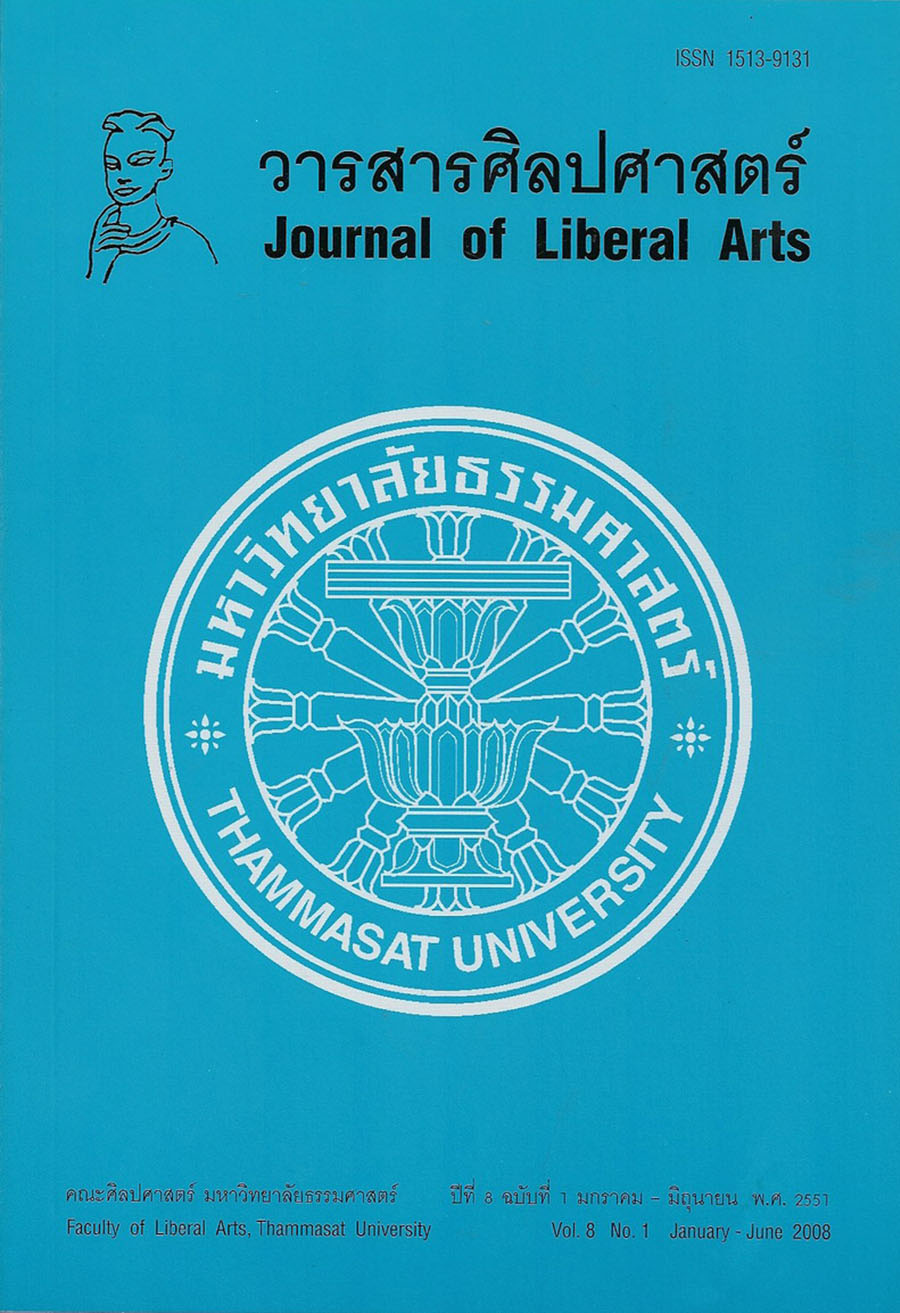วิเคราะห์ข้อผิดพลาดด้านการเขียนของนักศึกษาไทยที่เรียนภาษาญี่ปุ่นระดับสูง
Main Article Content
บทคัดย่อ
งานวิจัยนี้มีวัตถุประสงค์เพื่อศึกษาข้อผิดพลาดด้านการเขียนของนักศึกษาไทยที่เรียนภาษาญี่ปุ่นระดับสูง และศึกษาสาเหตุที่ทำให้เกิดข้อผิดพลาดรวมทั้งเสนอแนวทางแก้ไขหรือป้องกันไม่ให้เกิดข้อผิดพลาดอีก
ข้อมูลที่ใช้ในการศึกษา คือ ข้อผิดพลาดที่พบในงานเขียนของนักศึกษาชั้นปี 4 ที่ลงทะเบียนเรียนวิชา ญ.411 ภาษาญี่ปุ่น 7 และ ญ.412 ภาษาญี่ปุ่น 8 ในปีการศึกษา 2547 ทั้งหมด 584 ประโยค เป็นข้อผิดพลาดที่รวบรวมจากประโยคที่นักศึกษานำรูปประโยคในระดับ 1 ที่ได้เรียนไปแต่งประโยคเอง
ผลการวิเคราะห์พบว่า ข้อผิดพลาดส่วนใหญ่เป็นข้อผิดพลาดที่เกี่ยวเนื่องกับสิ่งที่ผู้เรียนได้เรียนแล้วในระดับต้น และระดับกลาง และเมื่อวิเคราะห์แยกตามประเภทของข้อผิดพลาดพบว่าข้อผิดพลาดที่เกี่ยวกับการใช้คำ และสำนวนผิดมีมากที่สุด (ร้อยละ 28.1) รองลงมาคือข้อผิดพลาดที่เกี่ยวกับการใช้คำช่วย (ร้อยละ 25.9)
จากผลการศึกษา กล่าวสรุปได้ว่าข้อผิดพลาดส่วนใหญ่ (มากกว่าร้อยละ 70) ไม่ได้เกิดจากการแทรกแซงของภาษาแม่ แต่แม้จะเป็นผู้เรียนภาษาญี่ปุ่นระดับสูง ก็ยังคงพบข้อผิดพลาดที่มีสาเหตุจากอิทธิพลของภาษาไทย ผู้วิจัยเสนอแนวทางแก้ไขเพื่อลดจำนวนข้อผิดพลาด 4 แนวทาง คือ 1) การใช้คลังข้อมูลภาษา 2) การฝึกให้ผู้เรียนรู้จักสังเกต 3) การเรียนแบบเพื่อนช่วยเพื่อน และ 4) การส่งเสริมให้ผู้เรียนเรียนรู้ด้วยตัวเอง
This study sets out to analyze the errors of Thai learners who take Japanese at an advanced level, while also examining the causes of these errors and suggesting a way to reduce them.
The data used in this study were the errors from 584 sentences gathered from writing tasks of the 4th year students enrolled in JP411 (Japanese 7) and JP412 (Japanese 8) in the academic year 2004. The errors were collected from the sentences they constructed with their knowledge of sentence patterns they learned from level 1.
The collected have acquired at the most errors are related to the things the learners have acquired at the beginning and intermediate levels. When categorized into types of error, the most frequent errors were misuse of words and expressions (28.1%), followed by particles (25.9%)
The conclusion of this study is that the majority of errors (more than 70%) are not caused by the interference of the first language. However, even among learners at the advanced level, errors caused by the influence of the Thai language are still found. The researcher suggests four ways to reduce the errors which are 1) consulting the corpus of word and language usage 2) training the learners to be observant 3) operating peer learning and 4) encouraging self-study.


